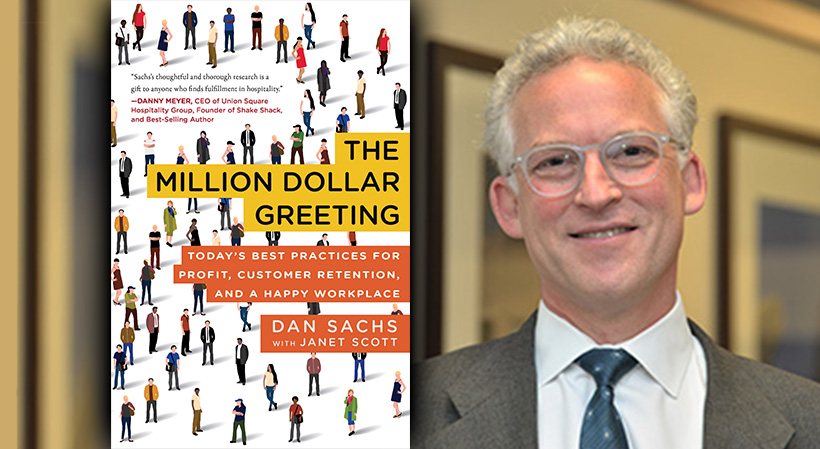The following excerpt is adapted from “The Million Dollar Greeting” by Dan Sachs. Apollo Publishers, 2018.
Mike McDerment: “The culture is way bigger than me. It’s not a cult of Mike here.”
Dan Sachs: “Well it started out that way, more or less.”
Mike McDerment: “I don’t think [of it] as a cult of Mike. I think [of it as] a cult of, ‘I want to be in a company that helps people and actually is dedicated to customers, a company that works really hard at building great products.’ Those things aren’t Mike per se.”
If you’re a sole proprietor or the owner of a small business, you know that one of the most challenging things is staying on top of the financials when all you want to do is deliver your service or manufacture your product. Mike McDerment, co-founder and CEO of FreshBooks, a cloud-based accounting software company in Toronto, Canada, knows exactly how you feel.
In 2003, Mike was the head of a four-person website design business that he had dropped out of business school to start. One day, he accidentally saved over an old invoice. Instead of cursing his own stupidity and then moving on like most people, he decided to do something about it. He spent the next two weeks coding a computer program that would be more user friendly than Microsoft Excel. By the end of that time, he had laid the foundation of what has evolved into FreshBooks, a 300-person company whose mission is to “reshape the world to suit the needs of self-employed professionals.”
Related: Better Customer Service Through Facebook Messenger Bots
Growth Canadian style: Free range and sustainable
FreshBooks started out in Mike’s parents’ basement in Toronto less than 15 years ago. In 2016, it was not only recognized as “The Best Workplace in Canada” (for a medium-sized company) by the Great Place to Work institute, but also as a company “that keeps its millennials from quitting” by CNBC.com. To learn how Mike kept all of these millennials around (and other things), I caught up with Mike—and his dog—at the FreshBooks headquarters.

Before we start chatting, he gives me a quick tour that includes a stop at the company kitchen/cafeteria for a glass of water. It’s a very comfortable environment, and I feel at ease immediately as I observe various teams collaborating in the kitchen and at work stations. We settle into Mike’s office, which is purposefully located near the bathrooms to encourage employees to stop by and chat.
I was there to find out how FreshBooks developed such a strong culture of customer service along with a mission and workplace that appeals to millennials. One of the things that I found so interesting about FreshBooks was that, unlike some of the other companies that I’ve visited over the years, FreshBooks developed a culture of outstanding customer service organically without ever talking about it. This may have something to do with the fact that the last job Mike had before owning his own website design business was leading canoe trips at a camp. (Perhaps catering to an audience of tweens and teens provided good experience for his current line of work). Regardless, Mike feels that the lack of a roadmap was ultimately a benefit despite the bumps along the way.
“People tell me, ‘Hey, other companies don’t do this. It’s not software culture,’” he says. “I didn’t know that. It’s made some things take longer than they needed to, but I think a lot of the things that make this place special and different are because when you go and learn something somewhere else, you start doing stuff and don’t necessarily think about why. There were parts of our growth story that could have been less painful or happened faster. But then I don’t think you get the magic.”
When Mike started FreshBooks, he was still trying to run the website design company he’d developed. Facing the fact that it was too tough to do both, he transitioned out of the latter to focus on the company that’s here today. Along the way, he had to learn everything from scratch, from building the company’s software and marketing it, to scaling his services, all the while fighting to retain clients and employees.
“We were really obsessed with customer service from the get-go. We were very concerned with our quality. We were very timely with our responses, always answered the phones. We put our phone number on our website from the earliest of days, even when we were trying to make our company look way bigger than we were. We staffed over the holidays. We were always on for customers.”
FreshBooks’s passion for focusing on and rewarding outstanding customer service is built into the DNA of the company and comes from Mike himself—a guy who readily concedes there are people who don’t find him empathetic upon first meeting him. However, he adds, “I’m unusually good at putting myself in other people’s shoes. I’m not perfect, nobody is. I don’t always get it right. But when I’m talking to a client, I transition into, ‘What problem are you trying to solve? How can I help you do that?’ I’m wide open at those times.”
Although I’m in my 50s now, I still can totally relate to his missteps. It’s hard starting a business when you’re in your 20s because it’s more expensive, time-consuming, and challenging than you can ever imagine. That’s one of the main reasons why so many new businesses fail even if they start out with a great idea. Mike isn’t afraid to talk about the times he almost failed, and he’s justifiably proud of making it through to the other side.
“Our insight is the world is not built for self-employed professionals or their teams, which is not surprising because we grew up in the age of corporations. Then you start to look at how the world [is] set up for [self-employed] people and the short answer is not well at all. That’s where we come in.”
Thus, the company’s mission was born: “To reshape the world to suit the needs of self-employed professionals and their teams.” And it has had a profound influence on the company’s culture.
FreshBooks is at the right place at the right time.
According to the US Bureau of Labor Statistics, 10.1 percent of the U.S. population was self-employed in 2016, and that number is expected to grow significantly over the next decade.
Sign Up: Receive the StartupNation newsletter!
FreshBook’s recipe for success
Of all the companies profiled (in this book), FreshBooks has probably given the most thought to matching its vision and values with those of the millennial generation. It’s no surprise that FreshBooks is in the top five favorite places to work in various polls year after year, receiving recognitions such as being named in 2017 as one of the “Best Workplaces in Technology” by Great Place to Work Canada. That said, their recipe for success really isn’t contrived, based on following a protocol or list of “ingredients”: it shows itself in its everyday operations. There is very little about FreshBooks that is designed or determined in a traditional corporate manner. Mike has developed a set of values rather than a rulebook to guide the company, and his employees accept his vision.
You might say, “Well, I know myself, and I am not that kind of leader so what can I take away from FreshBooks’s lessons?” I think there is actually a lot of useful information you can take from FreshBooks, as long as you believe that Mike’s approach to employees and the workplace is valuable:
- Physical space matters. Think about the nature of the floor plan— open spaces and collaborative glass meeting rooms—all of which are becoming more standard in the modern workplace. However, just making collaborative spaces isn’t enough. If you fail to integrate the other essential pieces of the FreshBooks puzzle, it’s the same death by a thousand pricks.
- Everyone likes to be positively recognized for what they do. People at the bottom of the pecking order work very hard. Those usually unsung “Rock Stars” are often what can make or break a company. It’s no coincidence that there’s excellent customer service at FreshBooks, where everyone starts out as a rock star. Another way employees are recognized, a $25 gift card, doesn’t seem like much, but it can go a long way toward making someone feel good about themselves and their job.
- People want to be allowed to solve problems without a manager looking over their shoulder. Do some employees go overboard and make mistakes? Yep. But Mike would rather employees be too generous than not generous enough.
Great leaders such as Mike recognize that filtering for empathetic employees requires additional effort but pays off in the long run. Just as important is a company’s environment, which must be supportive and accountable to its employees. But perhaps most importantly, the culture has to be genuine. As Mike explains, genuine corporate culture gives a company purpose, which inspires its employees, which translates directly to extraordinary customer service. And great profits to boot.
“The Million Dollar Greeting” is available now at fine booksellers and can be purchased via StartupNation.com.






